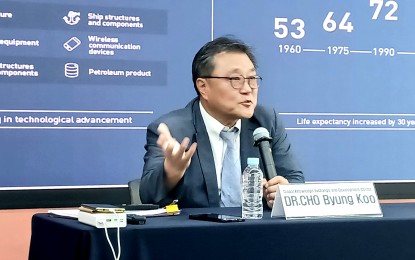
POLICY REVIEW. Korean Development Institute visiting senior fellow Cho Byung Koo discusses the possible impact of the declining population in South Korea at the Korea Culture and Information Services (KOCIS) Center in Seoul on September 18, 2023. He said the newly signed Philippines-Republic of Korea Free Trade Agreement could help address the looming problem by including a chapter on the movement of people in future reviews. (PNA photo by Kris Crismundo)
SEOUL – Think tank Korean Development Institute (KDI) believes that introducing a chapter on the movement of people in the newly signed Philippines-Republic of Korea (PH-ROK) Free Trade Agreement (FTA) could be beneficial to address the changing demographics in South Korea.
KDI visiting senior fellow Cho Byung Koo told participants of the Korean Culture and Information Services (KOCIS) 2023 International Journalists Invitation Program on September 18 that opening up Korea’s immigration policy could be a quick fix to the looming economic impacts of the declining population of the East Asian country.
“You cannot produce children in a day. While the Filipinos are productive, and the industrial peace, we can get along together pretty well, then why not (open up the immigration policy),” Cho said.
World Bank data shows that South Korea’s population growth rate in 2022 declined by 0.2 percent.
Cho added that the changing demographics of South Korea could affect its productivity and could slow down economic growth.
He said the policy research agency would agree to include a chapter on the movement of people in the review of the PH-ROK FTA, which will be done every five years once the trade pact enters into force.
The PH-ROK FTA that was signed last Sept.7 focuses on trade in goods and economic and technical cooperation.
“Temporarily, the only escape route of Korea is (allowing) immigration much wider,” Cho said.
While the inclusion of the new chapter is not yet possible in the near term, the KDI fellow said it is possible to use the FTA, through investments of Korean companies in the Philippines, to do the manufacturing or services in the Philippines, and export the output back to Korea, especially for goods that have zero tariff.
However, Cho said the Philippines should provide better business conditions (than its neighbors) to attract Korean firms to invest.
“Korea invested a lot in China market, but the political change in China, Korean companies have to withdraw from China. Then they went to Vietnam because they have more population, more ready to produce things,” he said.
“If anything happens, Korea has to look for some other places - Indonesia is the next market, maybe. If the Philippines can provide better conditions…the (business) guys - all they think is to make money in stable conditions, the human capital productivity, and the political stability,” Cho said. (PNA)
